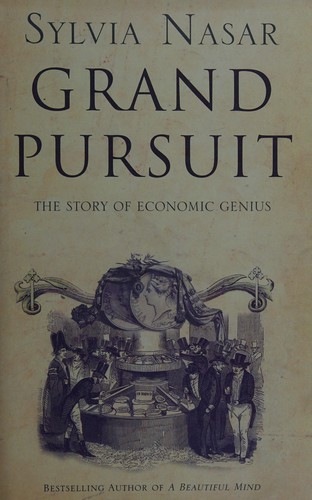558 pages
English language
Published Nov. 20, 2011 by Fourth Estate.

558 pages
English language
Published Nov. 20, 2011 by Fourth Estate.
Sylvia Nasar, the author of the phenomenal bestseller A Beautiful Mind takes us on a journey through the epic story of the making of modern economics, and how it rescued mankind from squalor and deprivation by placing its material fate in its own hands, rather than in Fate. Nasar's account begins with Charles Dickens and Henry Mayhew observing and publishing the condition of the poor majority in mid 19th century London, the richest and most glittering place in the world. This was a new pursuit. She then describes the efforts of Marx, Engels, Alfred Marshall, Beatrice and Sydney Webb, and Irving Fisher to put those insights into action - with revolutionary consequences for the world. From the great John Maynard Keynes to Schumpeter, Hayek, Keynes's disciple Joan Robinson, the influential American economists Paul Samuelson and Milton Friedman, and India's Nobel Prize Winner Amartya Sen, she show how the insights of …
Sylvia Nasar, the author of the phenomenal bestseller A Beautiful Mind takes us on a journey through the epic story of the making of modern economics, and how it rescued mankind from squalor and deprivation by placing its material fate in its own hands, rather than in Fate. Nasar's account begins with Charles Dickens and Henry Mayhew observing and publishing the condition of the poor majority in mid 19th century London, the richest and most glittering place in the world. This was a new pursuit. She then describes the efforts of Marx, Engels, Alfred Marshall, Beatrice and Sydney Webb, and Irving Fisher to put those insights into action - with revolutionary consequences for the world. From the great John Maynard Keynes to Schumpeter, Hayek, Keynes's disciple Joan Robinson, the influential American economists Paul Samuelson and Milton Friedman, and India's Nobel Prize Winner Amartya Sen, she show how the insights of these activist thinkers transformed the world - from one city, London, to the developed nations in Europe and America and now the entire world. In Nasar's dramatic account of these discoverers we witness men and women responding to personal crises, world wars, revolutions, economic upheavals, and each others' ideas to turn back Malthus and transform the dismal science into a triumph over mankind's hitherto age-old destiny of misery and early death. This story, unimaginable less than 200 years ago, is a story of trial and error, and ultimately transcendent, rendered here in stunning narrative.